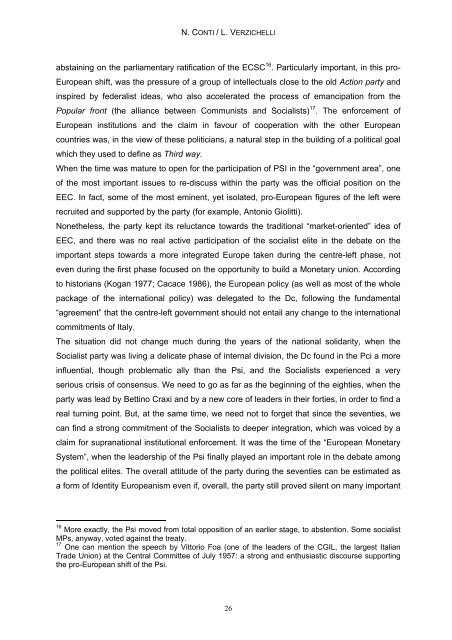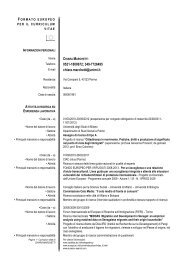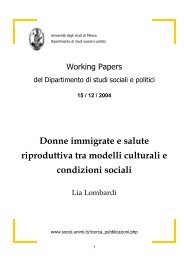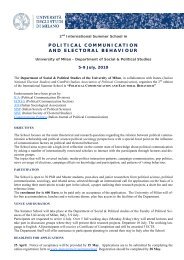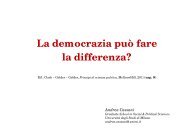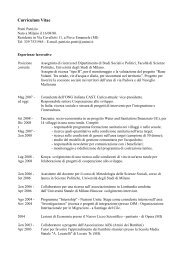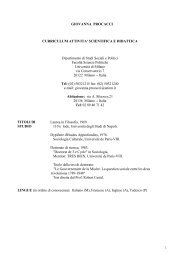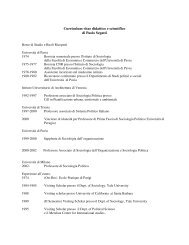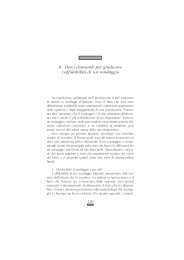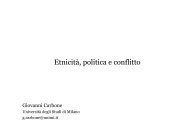The european dimension of political discourse in Italy. A ... - CIRCaP
The european dimension of political discourse in Italy. A ... - CIRCaP
The european dimension of political discourse in Italy. A ... - CIRCaP
Create successful ePaper yourself
Turn your PDF publications into a flip-book with our unique Google optimized e-Paper software.
N. CONTI / L. VERZICHELLI<br />
absta<strong>in</strong><strong>in</strong>g on the parliamentary ratification <strong>of</strong> the ECSC 16 . Particularly important, <strong>in</strong> this pro-<br />
European shift, was the pressure <strong>of</strong> a group <strong>of</strong> <strong>in</strong>tellectuals close to the old Action party and<br />
<strong>in</strong>spired by federalist ideas, who also accelerated the process <strong>of</strong> emancipation from the<br />
Popular front (the alliance between Communists and Socialists) 17 . <strong>The</strong> enforcement <strong>of</strong><br />
European <strong>in</strong>stitutions and the claim <strong>in</strong> favour <strong>of</strong> cooperation with the other European<br />
countries was, <strong>in</strong> the view <strong>of</strong> these politicians, a natural step <strong>in</strong> the build<strong>in</strong>g <strong>of</strong> a <strong>political</strong> goal<br />
which they used to def<strong>in</strong>e as Third way.<br />
When the time was mature to open for the participation <strong>of</strong> PSI <strong>in</strong> the “government area”, one<br />
<strong>of</strong> the most important issues to re-discuss with<strong>in</strong> the party was the <strong>of</strong>ficial position on the<br />
EEC. In fact, some <strong>of</strong> the most em<strong>in</strong>ent, yet isolated, pro-European figures <strong>of</strong> the left were<br />
recruited and supported by the party (for example, Antonio Giolitti).<br />
Nonetheless, the party kept its reluctance towards the traditional “market-oriented” idea <strong>of</strong><br />
EEC, and there was no real active participation <strong>of</strong> the socialist elite <strong>in</strong> the debate on the<br />
important steps towards a more <strong>in</strong>tegrated Europe taken dur<strong>in</strong>g the centre-left phase, not<br />
even dur<strong>in</strong>g the first phase focused on the opportunity to build a Monetary union. Accord<strong>in</strong>g<br />
to historians (Kogan 1977; Cacace 1986), the European policy (as well as most <strong>of</strong> the whole<br />
package <strong>of</strong> the <strong>in</strong>ternational policy) was delegated to the Dc, follow<strong>in</strong>g the fundamental<br />
“agreement” that the centre-left government should not entail any change to the <strong>in</strong>ternational<br />
commitments <strong>of</strong> <strong>Italy</strong>.<br />
<strong>The</strong> situation did not change much dur<strong>in</strong>g the years <strong>of</strong> the national solidarity, when the<br />
Socialist party was liv<strong>in</strong>g a delicate phase <strong>of</strong> <strong>in</strong>ternal division, the Dc found <strong>in</strong> the Pci a more<br />
<strong>in</strong>fluential, though problematic ally than the Psi, and the Socialists experienced a very<br />
serious crisis <strong>of</strong> consensus. We need to go as far as the beg<strong>in</strong>n<strong>in</strong>g <strong>of</strong> the eighties, when the<br />
party was lead by Bett<strong>in</strong>o Craxi and by a new core <strong>of</strong> leaders <strong>in</strong> their forties, <strong>in</strong> order to f<strong>in</strong>d a<br />
real turn<strong>in</strong>g po<strong>in</strong>t. But, at the same time, we need not to forget that s<strong>in</strong>ce the seventies, we<br />
can f<strong>in</strong>d a strong commitment <strong>of</strong> the Socialists to deeper <strong>in</strong>tegration, which was voiced by a<br />
claim for supranational <strong>in</strong>stitutional enforcement. It was the time <strong>of</strong> the “European Monetary<br />
System”, when the leadership <strong>of</strong> the Psi f<strong>in</strong>ally played an important role <strong>in</strong> the debate among<br />
the <strong>political</strong> elites. <strong>The</strong> overall attitude <strong>of</strong> the party dur<strong>in</strong>g the seventies can be estimated as<br />
a form <strong>of</strong> Identity Europeanism even if, overall, the party still proved silent on many important<br />
16 More exactly, the Psi moved from total opposition <strong>of</strong> an earlier stage, to abstention. Some socialist<br />
MPs, anyway, voted aga<strong>in</strong>st the treaty.<br />
17 One can mention the speech by Vittorio Foa (one <strong>of</strong> the leaders <strong>of</strong> the CGIL, the largest Italian<br />
Trade Union) at the Central Committee <strong>of</strong> July 1957: a strong and enthusiastic <strong>discourse</strong> support<strong>in</strong>g<br />
the pro-European shift <strong>of</strong> the Psi.<br />
26


